FIFA World Cup: The Greatest Show on Earth
Is anyone unaware of the FIFA World Cup? Nobody, we all think! Welcome to the FIFA World Cup, a festival of skill, passion, and patriotism that brings people together every four years. The World Cup is more than simply a game; it's a worldwide phenomenon that has influenced generations, created heroes, and sparked life-changing events. The tournament's development from modest beginnings to a billion-dollar industry reflects the ascension of the beautiful game to contemporary greatness.
The Birth and Evolution of the FIFA World Cup
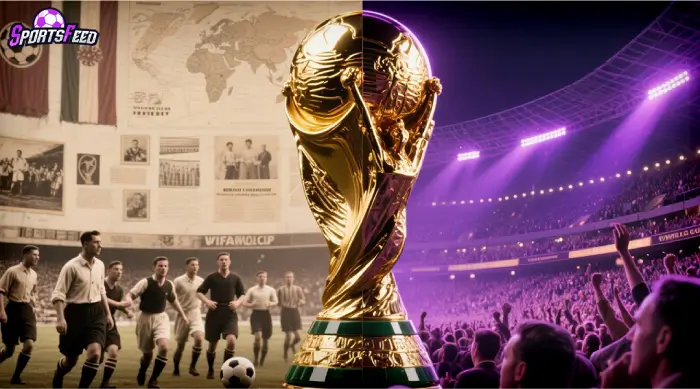
Driven by FIFA President Jules Rimet's ambition for an international football competition apart from the Olympics, the FIFA World Cup got underway in 1930. Thirteen teams competed, and Uruguay hosted the first event and won the first championship. At first small, the event encountered difficulties such as little participation because of travel restrictions and political unrest. International football was founded by early editions, which included players like José Nasazzi of Uruguay, and created a tradition of fierce competition that enthralled supporters all over the world.
Over the decades, the World Cup transformed into a cultural juggernaut, watched by billions. Its expansion to 32 teams by 1998 and 48 teams in 2026 reflects growing global interest. Innovations like VAR technology, advanced broadcasting, and massive stadiums have elevated its spectacle. Despite controversies, such as hosting disputes, the tournament adapts, integrating modern logistics and inclusivity. Icons like Pelé, Maradona, and Messi have defined their history, cementing the World Cup as football’s ultimate stage.
Key Milestones in FIFA World Cup History
|
Year |
Milestone |
|
1930 |
Inaugural World Cup: Hosted in Uruguay, the first tournament featured 13 teams. Uruguay won, defeating Argentina 4-2, establishing the World Cup as a global football event. |
|
1950 |
Uruguay’s Shock Victory: Brazil hosted, but Uruguay stunned the world by defeating Brazil 2-1 in the “Maracanazo,” marking one of football’s greatest upsets at Maracanã Stadium. |
|
1958 |
Pelé’s Emergence: In Sweden, 17-year-old Pelé led Brazil to their first title, defeating the hosts 5-2. His six goals signaled the rise of a global football icon. |
|
1970 |
Brazil’s Third Title: Brazil’s dazzling team, led by Pelé, won in Mexico, earning the Jules Rimet Trophy permanently. The 4-1 final win over Italy showcased attacking brilliance. |
|
1991 |
Women’s World Cup Launch: The first FIFA Women’s World Cup in China marked a milestone for gender equality, with the USA defeating Norway 2-1, boosting women’s football globally. |
|
2002 |
Asia’s First World Cup: Co-hosted by Japan and South Korea, it was the first held outside Europe or the Americas. Brazil won, and South Korea’s semi-final run inspired. |
|
2010 |
Africa’s First World Cup: South Africa hosted a historic moment for the continent. Spain won their first title, defeating the Netherlands 1-0, with Andrés Iniesta’s extra-time goal. |
|
2022 |
Middle East Debut: Qatar hosted the first Middle Eastern World Cup. Argentina, led by Lionel Messi, won 4-2 on penalties against France, ending a 36-year title drought. |
The Trophy Evolution
The FIFA World Cup trophy has evolved significantly. The original Jules Rimet Trophy, used from 1930 to 1970, was awarded permanently to Brazil after their third win. Stolen in 1983, it was never recovered. Since 1974, the current FIFA World Cup Trophy, designed by Silvio Gazzaniga, symbolizes global football excellence, with the winners’ names engraved on its base.

Unforgettable FIFA World Cup Moments
The FIFA World Club has delivered electrifying moments that echo through history, igniting passion and etching legends into football’s soul. From shocking upsets to iconic goals, these instants define eras and inspire generations.
Legendary Matches that Defined Eras
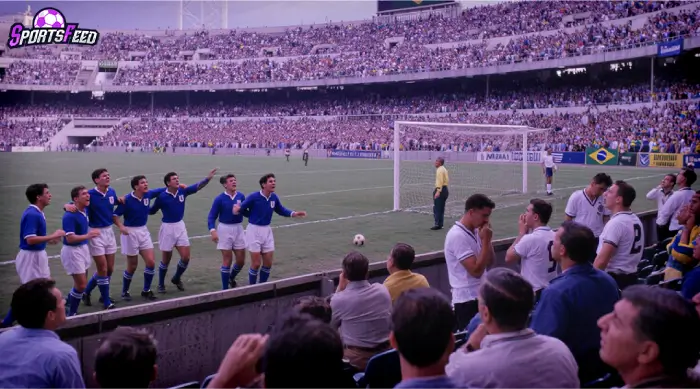
The Maracanazo (1950)
Uruguay stunned Brazil 2-1 in Rio’s Maracanã, silencing 200,000 fans. Alcides Ghiggia’s goal sealed the “Maracanazo,” a heart-wrenching upset that forever marked football’s unpredictability and Uruguay’s grit.

The Hand of God & Goal of the Century (1986)
Diego Maradona’s audacious handball and dazzling solo run past England in Mexico ’86 redefined genius. His two goals in a 2-1 win cemented Argentina’s dominance and his eternal legacy.
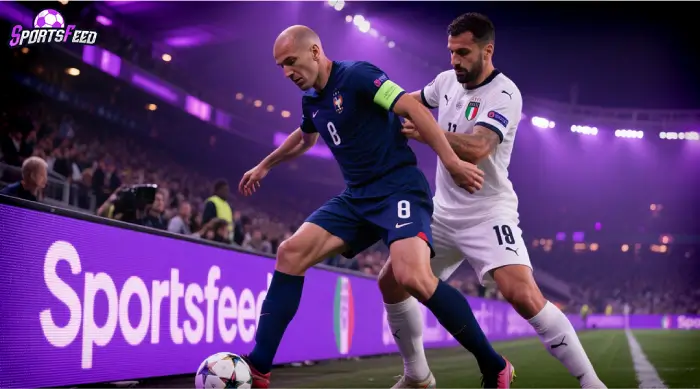
Zidane’s Final Act (2006)
Zinedine Zidane’s Panenka penalty in the final was overshadowed by his headbutt on Marco Materazzi. France fell to Italy on penalties, but Zidane’s dramatic exit in Berlin immortalized him.
Underdog Stories that Captured Hearts
Cameroon’s Indomitable Lions (1990)
Cameroon shocked Argentina 1-0 in Italia ’90, with Roger Milla’s flair. Their quarter-final run, fueled by fearless play, inspired Africa and redefined underdog spirit on the global stage.
South Korea’s Miracle Run (2002)
Co-hosts South Korea, led by Guus Hiddink, defied odds, beating Italy and Spain to reach the semi-finals. Their passionate fans and 4-3 penalty win over Spain electrified the world.
Croatia’s Golden Generation (2018)
Croatia’s Luka Modrić and team battled to the 2018 final, defeating England in extra time. Their 4-2 loss to France couldn’t dim their historic run, captivating global hearts.
Morocco’s Historic Run (2022)
Morocco became Africa’s first semi-finalists in Qatar, defeating Spain and Portugal. Yassine Bounou’s heroics and Hakim Ziyech’s flair united a nation, inspiring underdogs everywhere with their fearless spirit.
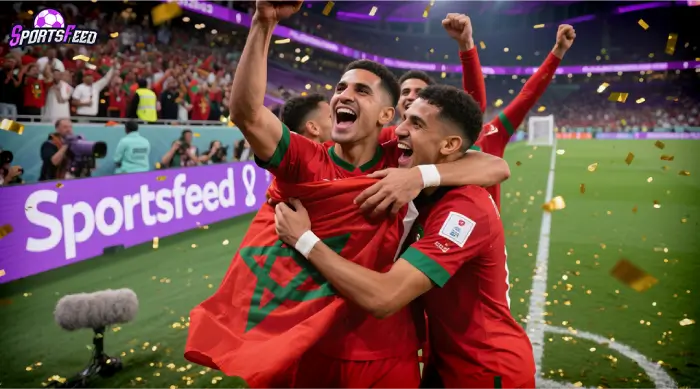
Legendary Players Who Defined the FIFA World Cup
The FIFA club has been shaped by transcendent talents whose brilliance ignited stadiums and inspired generations. These icons, through breathtaking skill and unforgettable moments, have etched their names into football’s eternal history, defining the tournament’s legacy.

Pelé (Brazil)
Pelé, Brazil’s prodigy, won three World Cups (1958, 1962, 1970), scoring 12 goals. His dazzling flair and 1970 final’s artistry against Italy (4-1) made him football’s first global superstar, redefining attacking brilliance.

Diego Maradona (Argentina)
Maradona’s 1986 World Cup heroics, including the “Hand of God” and “Goal of the Century” against England, led Argentina to glory. His five goals and unmatched creativity in Mexico cemented his legendary status.

Zinedine Zidane (France)
Zidane’s 1998 World Cup triumph, scoring twice in France’s 3-0 final win over Brazil, showcased his elegance. Despite his 2006 headbutt controversy, his eight goals and playmaking genius defined an era.

Ronaldo (Brazil)
Ronaldo, “O Fenômeno,” scored 15 World Cup goals, leading Brazil to 2002 glory with eight goals, including two in the final. His explosive pace and finishing overcame injuries, marking him as iconic.
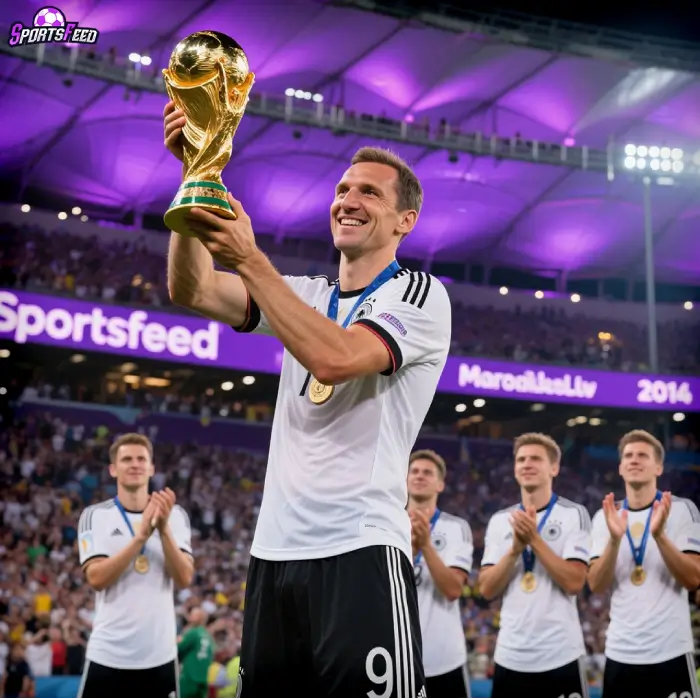
Miroslav Klose (Germany)
Klose, Germany’s record-breaking 16-goal World Cup scorer, shone from 2002 to 2014. His 2014 triumph, including a semi-final goal against Brazil (7-1), and acrobatic celebrations made him a clinical legend.

Lionel Messi (Argentina)
Messi’s 2022 World Cup triumph capped his legacy, scoring seven goals, including two in the final against France. His vision, dribbling, and leadership in Qatar fulfilled Argentina’s 36-year dream, solidifying his greatness.
Record Holders and Statistical Giants
The world of football is home to giants - legendary clubs with incredible records that most football fans can recite by heart. The FIFA World Cup showcases extraordinary records, where statistical giants etch their names into football’s history. From prolific goal scorers to enduring participants, these milestones highlight the tournament’s legacy of brilliance and unforgettable achievements.
|
Record |
Player |
Country |
Achievement |
Year(s) |
|
Most Goals |
Miroslav Klose |
Germany |
16 goals across 4 tournaments |
2002-2014 |
|
Most Appearances |
Lionel Messi |
Argentina |
26 matches across 5 tournaments |
2006-2022 |
|
Most World Cups |
Pelé |
Brazil |
3 titles won |
1958, 1962, 1970 |
|
Most Goals in One Tournament |
Just Fontaine |
France |
13 goals in one tournament |
1958 |
|
Youngest Goalscorer |
Pelé |
Brazil |
17 years, 239 days |
1958 |
|
Oldest Goalscorer |
Roger Milla |
Cameroon |
42 years, 39 days |
1994 |
Cultural and Economic Impact of the FIFA World Cup
Economic Transformation of Host Nations
The FIFA World Cup drives transformative economic and cultural impacts, reshaping host nations through infrastructure and tourism while uniting global fans. Its legacy, though, balances immense benefits against social and ethical challenges.
Infrastructure Development
Hosting the FIFA World Cup catalyzes transformative infrastructure projects, including stadiums, roads, and public transit. Qatar’s $200–300 billion investment for 2022 enhanced urban connectivity, while South Africa’s 2010 event created 130,000 jobs and added $93 billion to GDP. However, costly venues, like Brazil’s 2014 stadiums, often become “white elephants” if not repurposed, underscoring the need for sustainable planning to ensure long-term economic benefits.
Tourism and Global Exposure
The World Cup drives tourism and global visibility, with Qatar 2022 attracting over 1 million visitors, generating $1.56 billion. The 1994 USA event boosted Los Angeles’ economy by $623 million. Media exposure elevates host nations’ global brand, as seen in Germany in 2006, but tourism surges often fall short, as in South Africa in 2010, requiring strategic planning to maximize long-term economic gains.
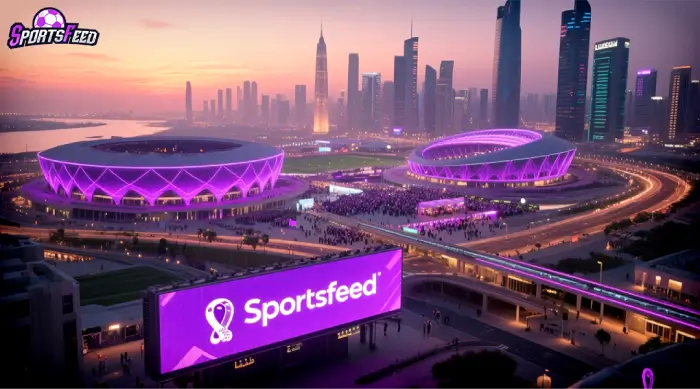
Social and Cultural Significance
|
Positive Social Impacts |
Challenges and Controversies |
|
The United Nations fosters cultural exchange globally. |
Migrant worker exploitation in Qatar 2022 raised concerns. |
|
Boosts national pride through cultural showcases. |
Bribery scandals in 2018/2022 bidding eroded trust. |
|
Promotes inclusivity via anti-racism campaigns. |
Environmental strain from large-scale infrastructure projects. |
|
Inspires youth sports, like the USA 1994’s MLS boost. |
Economic benefits often bypass poorer local communities. |
Global Television Phenomenon
The World Cup’s global reach, amplified by television and digital platforms, makes it a cultural juggernaut. The 2022 Qatar final drew over 3 billion viewers, with 5 billion engaging overall, cementing its status as the world’s most-watched event. Broadcasting rights, a key revenue stream, generated $4.7 billion for FIFA in 2022, reflecting its commercial power. Advancements in streaming and social media have expanded access, connecting remote audiences and driving merchandise sales. This visibility transforms host nations’ cultural narratives, as seen with Qatar’s 2022 focus on Arab heritage, though controversies like worker rights overshadowed some gains. The tournament’s universal appeal fosters a shared global passion, uniting fans across borders.
Recent FIFA World Cup Tournaments
The FIFA World Cup continues to captivate billions, blending cultural significance with sporting excellence. The 2022 Qatar tournament, a landmark event, showcased groundbreaking moments and record-breaking performances, solidifying its place in football history.
Qatar 2022: A Tournament of Firsts
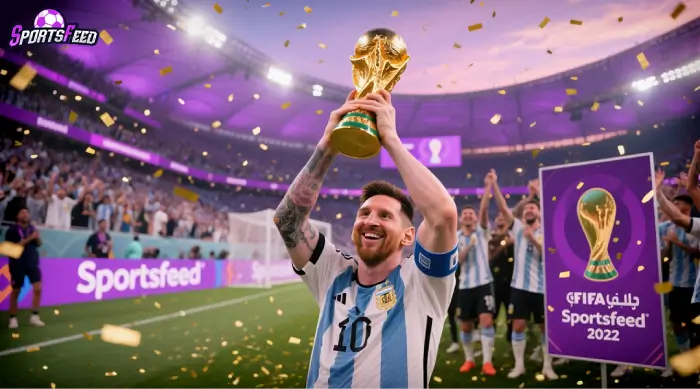
Held from November 20 to December 18, 2022, Qatar 2022 was the first World Cup in the Middle East and the Arab world, hosted across eight cutting-edge stadiums. The compact geography allowed fans to attend multiple matches daily, a historic first. Argentina, led by Lionel Messi, won their third title, defeating France 4-2 in a penalty shootout after a thrilling 3-3 final, hailed as one of the greatest ever. Morocco became the first African and Arab nation to reach the semi-finals, inspiring global fans.
Tournament Highlights
The tournament featured shocks like Saudi Arabia’s 2-1 upset over Argentina and Japan’s victories over Germany and Spain. Women referees officiated a men’s World Cup match for the first time, marking a step toward gender equality.
Tournament Statistics
With 172 goals across 64 matches, Qatar 2022 set a record for the highest-scoring 32-team World Cup. Over 5 billion engaged globally, with 1.5 billion watching the final.
Looking Ahead: The 2026 FIFA World Cup
The 2026 FIFA World Cup, a historic spectacle, will unite global fans across North America, introducing an expanded format and vibrant host cities, promising unforgettable moments in football’s grandest stage.
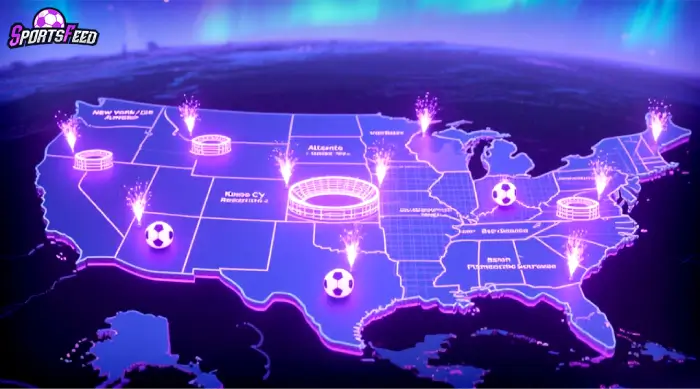
Key Facts About the 2026 Tournament
The 23rd FIFA World Cup, hosted by the USA, Canada, and Mexico, will feature 48 teams, a first for three nations co-hosting. With 104 matches, it’s set for June 11 to July 19, 2026, culminating at MetLife Stadium.
Format Changes
Expanding from 32 to 48 teams, the tournament is divided into 12 groups of four. The top two teams per group, plus the eight best third-placed teams, advance to a new round of 32, increasing matches from 64 to 104.
Host Cities
Sixteen cities, including 11 in the USA (e.g., Los Angeles, New York), three in Mexico (Mexico City, Guadalajara, Monterrey), and two in Canada (Toronto, Vancouver), will host matches.
Tournament Timeline
Kicking off June 11 at Estadio Azteca, the group stages run until June 27, followed by knockout rounds, with the final on July 19, 2026, spanning 39 days.
FIFA World Cup by the Numbers
The FIFA World Cup’s staggering numbers reflect its global dominance: 172 goals in 2022, 5 billion viewers, and $4.7 billion in broadcast revenue. These figures underscore its unmatched scale and cultural impact.
Tournament Champions
|
Country |
Wins |
Years |
Runner-up Finishes |
|
Brazil |
5 |
1958, 1962, 1970, 1994, 2002 |
1950, 1998 |
|
Germany |
4 |
1954, 1974, 1990, 2014 |
1966, 1982, 1986, 2002 |
|
Italy |
4 |
1934, 1938, 1982, 2006 |
1970, 1994 |
|
Argentina |
3 |
1978, 1986, 2022 |
1930, 1990, 2014 |
|
Uruguay |
2 |
1930, 1950 |
None |
|
France |
2 |
1998, 2018 |
2006, 2022 |
|
England |
1 |
1966 |
None |
|
Spain |
1 |
2010 |
None |
Impressive Tournament Records
Team Records
Most Appearances: Brazil, 22 tournaments (1930–2022).
Most Goals Scored: Brazil, 237 goals (1930–2022).
Largest Victory: Hungary 9-0 South Korea (1954).
Most Consecutive Wins: Brazil, 11 (2002–2006).
Most Titles as Host: Brazil, Italy, Mexico, Germany, France (1 each).
Tournament Growth
1930: 13 teams, 18 matches, Uruguay hosted.
1954–1978: Expanded to 16 teams, 38 matches by 1978.
1982–1994: Grew to 24 teams, 52 matches per tournament.
1998–2022: 32 teams, 64 matches, global viewership hit 5 billion.
2026 Onwards: 48 teams, 104 matches, hosted by USA, Canada, Mexico.
Total World Cup Matches Played (1930–2022): 900 matches.
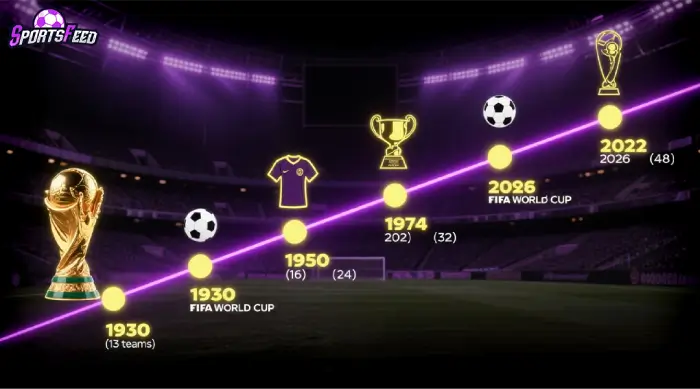
Economic Impact of the FIFA World Cup

The FIFA World Cup generates billions, with Qatar 2022 contributing $1.56 billion in tourism and $4.7 billion in broadcast revenue. Host nations see infrastructure boosts, like Qatar’s $200 billion investment, but costly venues risk becoming underused, requiring sustainable planning for long-term economic gains.
The Future of the FIFA World Cup
The FIFA World Cup’s future promises innovation and global reach, with the 2026 tournament, hosted by the USA, Canada, and Mexico, expanding to 48 teams. Emerging trends and challenges will shape its evolution, balancing football’s legacy with modern demands.
Emerging Trends and Predictions
-
Geographical Expansion: The 2026 World Cup across 16 North American cities will boost global access, with potential future hosts in Asia or Africa enhancing inclusivity.
-
Technological Integration: Advanced VAR, AI analytics, and immersive streaming will deepen fan engagement, with 5 billion viewers expected.
-
Sustainability Focus: Eco-friendly stadiums and carbon-neutral initiatives, like Qatar 2022’s efforts, aim to reduce environmental impact.
Challenges and Opportunities
-
Governance and Transparency: Addressing past bribery scandals through stricter oversight can restore FIFA’s credibility.
-
Balancing Tradition and Innovation: Expanding formats while preserving competitive integrity, like maintaining high-stakes knockout rounds, ensures the World Cup remains football’s pinnacle, uniting fans worldwide.

The Enduring Appeal of the FIFA World Cup
The FIFA World Cup captivates like no other, uniting people across cultures, continents, and generations. Whether in stadiums, homes, or city squares, it delivers raw emotion, national pride, and unforgettable drama. More than a sporting event, it’s a global celebration that transcends politics and language—a reflection of football’s universal power to inspire, connect, and ignite the hearts of millions worldwide.
The Eternal Magic of the FIFA World Cup
With each whistle blown, every crowd chant, and every decisive moment, the FIFA World Cup captures the spirit of football in its purest form. It’s where childhood dreams are realized, where legends are made, and where nations find common ground in shared passion. From Pelé’s brilliance to Messi’s redemption, the tournament weaves a timeless narrative of emotion, excellence, and human connection — a true celebration of the beautiful game.
FAQ
- What is the FIFA World Cup?
The FIFA World Cup is a global football tournament where national teams compete for the title of world champions, held every four years, captivating billions with its cultural and sporting impact.
- When was the first FIFA World Cup held?
The first FIFA World Cup was held in 1930 in Uruguay, with 13 teams competing. Uruguay won the inaugural title, defeating Argentina 4-2 in the final, launching a global football tradition.
- How many teams compete in the World Cup?
Currently, 32 teams compete in the FIFA World Cup, but the 2026 tournament will expand to 48 teams, increasing global participation and being hosted across the USA, Canada, and Mexico.
- Who has won the most World Cups?
Brazil has won the most World Cups, securing five titles (1958, 1962, 1970, 1994, 2002). Their dominance, led by stars like Pelé and Ronaldo, sets them apart in football history.
- How do teams qualify for the World Cup?
Teams qualify through continental confederation tournaments, like UEFA’s qualifiers or CONCACAF’s, based on performance over several years. Top teams advance, with slots allocated per region, ensuring global representation.
- How often is the FIFA World Cup held?
The FIFA World Cup is held every four years, typically in June or July, allowing national teams to prepare through qualifying rounds and ensuring a global spectacle of football excellence.
- What is the Women’s World Cup?
The Women’s World Cup is FIFA’s global tournament for women’s national teams, launched in 1991. Held every four years, it showcases stars like Alex Morgan, rivaling the men’s event in prestige.
- Where will the next FIFA World Cup be held?
The next FIFA World Cup in 2026 will be hosted by the USA, Canada, and Mexico, featuring 48 teams across 16 cities, with finals at MetLife Stadium in New Jersey.
- Who are some of the greatest World Cup players?
Pelé, Diego Maradona, Lionel Messi, Zinedine Zidane, and Ronaldo are among the greatest, delivering iconic performances, record-breaking goals, and unforgettable moments that shaped World Cup history and inspired generations.
- How can I watch the FIFA World Cup?
Watch the FIFA World Cup on broadcasters like FOX (USA), BBC/ITV (UK), or streaming platforms like ESPN+, Peacock, and FIFA+. Local providers like beIN Sports also cover matches, depending on your region.
